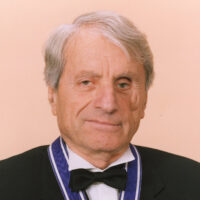
1997 Kyoto Prize Laureates
Music
/ Composer
1922 - 2001
Workshop: Xenakis in Kyoto
1997
11 /12 Wed
13:00 - 17:30
Place:Kyoto International Conference Center
Mr. Xenakis is considered a 20th century giant in the world of music, for his outstanding achievements. Viewing music as a physical acoustic phenomenon, he has established techniques for creating music mathematically. His compositions, consistently with the aid of computer science, from his first Metastasis through such representative works as Atrées, richly render a humanistic and spiritual cosmos liberated from the traditional European paradigm. Mr. Xenakis has unveiled a totally new dimension to the history of music.
*This category then was Category of Creative Arts and Moral Sciences.
Mr. Iannis Xenakis is a composer who views music mathematically as a physical, acoustic phenomenon and creates music with unique techniques using computers, unfolding an original world of music within the 20th century music scene.
Mr. Xenakis has studied music while at the same time specializing in architecture and mathematics. Since his defection to France, he has studied under Honegger, Milhand and Olivier Messiaen (the first Kyoto Prize laureate) and searched for a new mode of expression in music.
His debut piece, “Metastasis,” was created on the basis of a concept taken from architectural design, and features a dynamic development with an intertwining multitude of clusters of glissandos. Its premier performance at the Donaueschingen Festival was received enthusiastically. The following creation, “Pithoprakta,” adopted stochastic mathematical theory (probability calculus; ST).
Mr. Xenakis’ basic concept is that music is a process of transformation of cloud – like acoustic forms made up of elements called sound. The stochastic process involves mathematically determining the distribution of sound parameters when handling a large mass of sound. In many cases, formulae drawn from natural phenomena are used. A series of ST pieces for which computerized calculations were conducted,such as “Atrees” and “Morsima – Amorsima,” are considered pioneering achievements in this field. In 1965, Mr. Xenakis founded the Centre de l’Equipe de Mathematique et d’Automatique Musicules (CEMAMu), exploring new directions for music.
Mr. Xenakis is also a composer who developed the ideas of “musical space” as a physical space and “music of structure outside time” when the theory of musical time was the mainstream. It is said that the concept of structure outside time permits access to a world of music that is different from and more fertile than the in – time music tradition of European music.
In this sense, he has introduced a non – European philosophy into European music.
Founded on firm philosophical thought, Mr. Xenakis’ music has remained distinctly individual, without being obscured by various vogues of post – war avant – garde music and post – modernism and neo – romanticism that began in the mid – 1970s. His music is highly regarded for the rich, strong, compassionate impressions it gives, despite its mathematical methodology, and Mr. Xenakis’ warm personality is also widely admired.
For these reasons, The Inamori Foundation is pleased to bestow upon Mr. Iannis Xenakis the 1997 Kyoto Prize in Creative Arts and Moral Sciences.
Profile is at the time of the award.